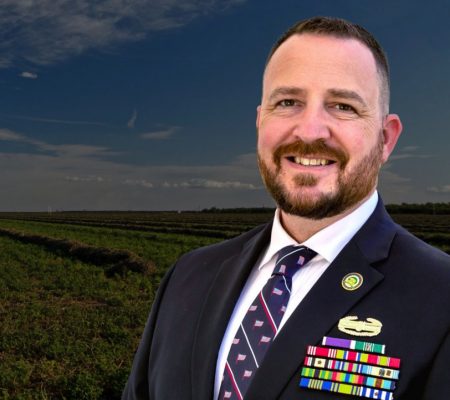

Sacramento – Last week, Governor Newsom has signed all of Assemblyman Mathis’s Veteran-related bills that passed the Legislature. Assemblyman Devon Mathis issued the following statement upon the chaptering of his bills:
“As the first year of the 2023-24 legislative session comes to a close, I am proud to report that all five of our Veteran-centered bills have been signed into law. We focused on mental health, employment, education, and recognition of service as key priorities in the veteran space this year. I would like to thank my Legislative colleagues as well as Governor Newsom for both recognizing the importance of these bills as well as taking the time and doing their respective parts to ensure they become law. As one of the most valuable portions of our California community, veterans deserve not only our attention as lawmakers, but also our dedication to elevating the status quo. Veterans’ service to our State and Country will not go unrecognized, and it is our duty as their elected representatives in government to make sure that the State of California is doing the most that it can to support them in every possible way, shape, and form.
The first bill I would like to highlight is AB 988: The Miles Hall Lifeline and Suicide Prevention Act. This Act, Joint-Authored by Assemblymember Wicks, will mandate that any entity seeking funds from the 988 State Suicide Behavioral Health Crisis Services Fund report the number of individuals who used the 988 Suicide and Crisis Lifeline and identified as veterans or active military personnel in its annual expenditure and outcome report. As many of you may already know, this matter is personal for me. I recently spoke on the Assembly floor about my experience as a veteran and how military service continued to affect my life in deep and destructive ways long after entering civilian life. We must not continue to stand by as our service members routinely take and consider to take their own lives. The simple fact that more veterans have taken their own lives than have fallen in post-9/11 combat is enough to recognize that our current mental health apparatus is fundamentally failing them. What we have done so far is clearly not close to enough. I am thankful for the passing of this legislation which will allow us to gather more data on this crucial subject in order to drive future legislation and efforts to alleviate the veteran mental health crisis that we have found ourselves in.
The period following the conclusion of service is a daunting time for many of our veterans. Some choose to enter the workforce immediately, and some choose to attend one of the various colleges or universities in our State. For those veterans that choose to pursue further education, it is imperative that we ensure they have both the access to and knowledge of the many resources available to them on campus. In order to make this more of a reality, AB 322, joint-authored by Assemblymember Garcia, will require the California State University, California Community Colleges, and request the University of California to develop and include within first-year and transfer student orientations the location and contact information of the campus point of contact for students who are veterans of the Armed Forces of the United States and members of the California State Guard and the California National Guard, and their dependents. For those service members who choose to enter the workforce following the conclusion of their service, we must do all we can to ensure a fast and easy transition. AB 883, an effort to streamline this process, will require state agencies to expedite applications of those who are enrolled in the Department of Defense’s SkillBridge program, thus aligning existing state policy to expedite veteran applications. This legislation will allow our service members to transition from the Armed forces into civilian employment with little to no gap in employment. Bridging this gap is one of the best solutions we have to ensure that the skills gained throughout veterans’ time in service do not fall to waste.
The most visible way we, as a Legislature, can show our appreciation to veterans and honor their sacrifices is through the installation of monuments on our Capitol Grounds. AB 298, joint-authored by Assemblymembers Davies, Garcia, and Ramos, authorizes a nonprofit organization that represents blind veterans to plan, construct, and maintain a braille American Flag to serve as a monument to the blind veterans of California and the United States in the State Capitol. There are over 158,000 blind veterans in our nation, and we must honor their sacrifice for us in a way that can be recognized by them. This flag will remind our blind veterans that they too hold a special place within the heart of California. AB 1452, joint-authored by Assemblymember Ramos, will also honor an important faction within our veteran community. This law authorizes a nonprofit organization that represents veterans of the wars in Iraq, Afghanistan and Kuwait to plan, construct, and maintain a monument honoring the veterans that were deployed and fought in either region on the grounds of the State Capitol. The veterans of these conflicts, which combined lasted from Aug 2, 1990 until Aug 30, 2021, and saw the deployment of between approximately 1.9 and 3 million service members, deserve our recognition and there is no better way to do this than by erecting a permanent monument in their honor. Generations to come will forever know that these men and women fought in defense of our freedoms, rights, and values as both Californians and Americans.
I am also happy to report that some of my colleagues have also had success with veteran legislation this year. Assemblymember Reyes’ AB 1474 will add veterans to the list of population groups included in the housing strategy of the Statewide housing Plan, which will ensure veterans’ particular homeless housing needs are addressed. Assemblymember Jim Patterson’s AB 1462 will require the California Department of Public Health to pull existing data from the state electronic death registration system to use for compiling an annual report on veteran drug overdose deaths. I would like to thank my colleagues for this legislation that stand to benefit outcomes for our veterans.
Despite the positive steps we have been able to take throughout the year, we have come up short as well with some good legislation failing to make it to the Governor’s desk. This includes AB 718 introduced by Assemblyman Tri Ta. This bill would have allowed the State to gather important data to receive a better picture of the gender-specific challenges facing women veterans. We cannot leave our women veterans behind after service, and gathering this data could have lead us in the right direction towards delivering the mental health care that they deserve. Another bill that regrettably did not make it to the Governor’s desk this year was SB 73 by Senator Seyarto. This bill would have allowed employers to establish a veterans’ hiring preference without opening the company to discrimination claims. Allowing companies to establish this practice could have opened many doors for veterans struggling to find work, and reducing the veteran unemployment rate is just one of the many ways we can alleviate the mental health crisis.
As the first millennial combat veteran with a purple heart elected to state office in the country, I hold veterans and the hardships that accompany post-service life near and dear to my heart. While I am proud to say that we were able to get five important bills concerning veterans issues signed into law this year, my work and the work of the State of California in this field is not yet finished. Next year, my office will continue to focus on veteran mental health and employment as well as push to end the addiction epidemic that continues to devastate our soldiers at home. The unique challenges that we, as veterans, face today require carefully contemplated and meticulously executed solutions which, as of now, do not adequately exist. I will continue to work tirelessly alongside my colleagues on both sides of the aisle to ensure that no veteran is ever forgotten or left in need of assistance when their service to our country is complete.”
#####

